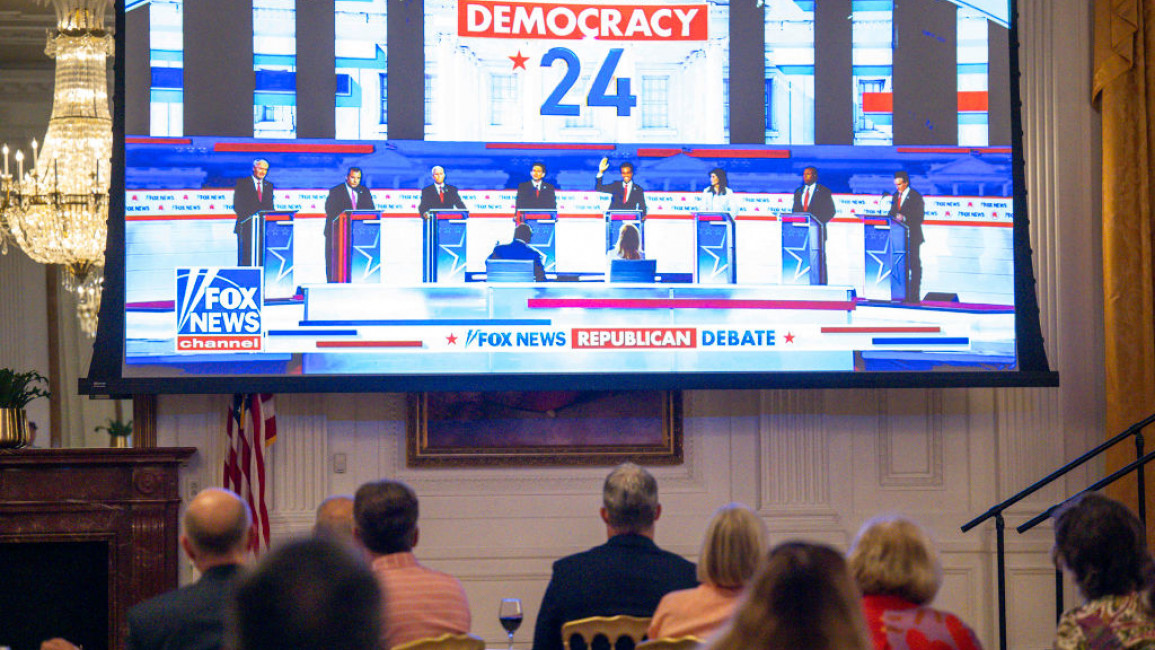Absent from first US Republican debate, Trump's presence loomed large
As a group of eight Republican presidential candidates took the stage Wednesday night, there was one person clearly missing. But while he was physically absent, Donald Trump's presence loomed large.
Even as he was expected to turn himself in at the Fulton County Jail in the state of Georgia the day after the debate, it was clear from the audience's reactions to the candidates' statements about Trump that he continues to enjoy a solid following -- and lead -- in the race.
"I would say that Trump is still very much in charge," J. Miles Coleman, associate editor of Sabato's Crystal Ball at the University of Virginia Center for Politics, told The New Arab.
"A lot of them are still tiptoeing around Trump. Until that dynamic changes, Trump is going to be in charge like he is now."
On the stage were Florida Governor Ron DeSantis, Senator Tim Scott of South Carolina, former South Carolina Governor Nikki Haley, entrepreneur Vivek Ramaswamy, former Vice President Mike Pence, former New Jersey Governor Chris Christie, North Dakota Governor Doug Burgum and former Arkansas Governor Asa Hutchinson.
As expected, candidates argued over who had the best experience, who would be the toughest at the southern border, and who would be best for the economy. However, when it came to Trump, the eight Republicans generally navigated with caution.
The one exception to this continued allegiance to the former president was Christie, who faced loud boos from the audience following his blunt criticisms of Trump.
"He's there to reclaim the party against Trump," said Patrick James, Patrick James, a professor of international relations at the University of Southern California, tells TNA. Otherwise, as a socially moderate candidate from a blue state, he doesn't think Christie expects to go far.
In addition to not wanting to alienate Trump's base, which is clearly still strong, it appeared that some of the candidates on stage were auditioning for the role of vice president.
Perhaps reading the room and the overall political climate of the Republican Party, Ramaswamy repeatedly praised Trump. "He was almost a stand-in for Trump," said Coleman.
DeSantis, on the other hand, who had until recently been enjoying a strong second place, has recently seen a vulnerability in his ranking as Ramaswamy gains ground.
"I think Ramaswamy overshadowed him," said Coleman of DeSantis. "It seemed like his heart wasn't in it. DeSantis kind of looked around to see what everyone else was doing [when asked if he would support the party's nominee].He's trying to be too many things to too many people."
As for Haley, one of the earliest to declare their intention to run for the 2024 presidential race, she briefly sparred with Ramaswamy over foreign policy, one area where she has experience, having served as the US ambassador to the United Nations. She spoke up over his statements that appeared to promote isolationism, accusing him of wanting to defund Israel and not seeing Russia as a serious threat.
Scott, who has been one of the top Republican fundraisers in the race, likely did not stand out as much as his backers had hoped. He criticised President Joe Biden's economic policies, criticised Democratic policies on violent crime, and took a clear stance on biological sex.
Pence, who struggled to find his place in an auditorium of Trump supporters, did not seem to gain any ground during the debate. However, like Scott, he probably didn't lose support either, with both remaining measured amid their more animated opponents.
The lesser-known candidates will likely not be seen on the next debate stage, unless their poll numbers improve.
As for Trump, his presence in the next round will also likely depend on poll numbers.
"I think Trump will continue not participating, as long as his poll numbers are high," said James. "There are so many hardliners in that party. It will be amazing if Trump gets the nomination, in spite of being one of the candidates the Democrats could beat."



